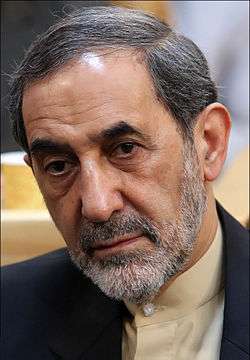Ali Akbar Velayati
| Ali Akbar Velayati | |
|---|---|
 | |
| President of Expediency Discernment Council's Center for Strategic Research | |
|
Assumed office 30 October 2013 | |
| Preceded by | Hassan Rouhani |
| Minister of Foreign Affairs | |
|
In office 15 December 1981 – 20 August 1997 | |
| President |
Ali Khamenei Akbar Hashemi Rafsanjani |
| Prime Minister | Mir-Hossein Mousavi |
| Preceded by | Mir-Hossein Mousavi |
| Succeeded by | Kamal Kharazi |
| Member of Parliament | |
|
In office 28 May 1980 – 15 December 1981 | |
| Constituency | Tehran, Rey and Shemiranat |
| Majority | 858,305 (52.5%) |
| Personal details | |
| Born |
24 June 1945 Shemiranat County, Iran |
| Political party |
Islamic Association of Physicians of Iran Islamic Coalition Party |
| Other political affiliations |
Islamic Republican Party (1979–1987) National Front (1961–1970s) |
| Spouse(s) |
Shirin Khoshnevisan (1980–2003, her death) Leyla Enayati (2007–present)[1] |
| Children | 6 |
| Alma mater |
Tehran University of Medical Sciences Johns Hopkins University |
| Awards |
|
| Signature |
 |
| Website | Official website |
Ali Akbar Velayati (Persian: علیاکبر ولایتی ![]() pronunciation ; born 24 June 1945) is an Iranian politician, physician and academic. He was the Minister of Foreign Affairs for more than sixteen years from 1981 to 1997 under Prime Minister Mir-Hossein Mousavi and Presidents Ali Khamenei and Akbar Hashemi Rafsanjani. He is the first and only person that have held this position for more than ten years. He is currently head of Center for Strategic Research. He was a candidate in 2013 presidential election and lost, coming fifth out of the six candidates garnering 2,268,753 votes, which was 6.18% of the votes.
pronunciation ; born 24 June 1945) is an Iranian politician, physician and academic. He was the Minister of Foreign Affairs for more than sixteen years from 1981 to 1997 under Prime Minister Mir-Hossein Mousavi and Presidents Ali Khamenei and Akbar Hashemi Rafsanjani. He is the first and only person that have held this position for more than ten years. He is currently head of Center for Strategic Research. He was a candidate in 2013 presidential election and lost, coming fifth out of the six candidates garnering 2,268,753 votes, which was 6.18% of the votes.
Early life and education
Velayati was born in Rostamabad village in Shemiran, Tehran, on 24 June 1945.[3][4] He was matriculated into Tehran University of medical sciences in 1964. Velayati finished his studies in pediatrics before moving to Johns Hopkins University for a fellowship in infectious diseases.[5] In the meantime, Velayati taught at university and is an active member of such influential bodies as the Supreme Council of Cultural Revolution, Expediency Council and Islamic Encyclopedia Foundation. During the rule of Mohammad Reza Shah, Velayati was arrested by the intelligence service SAVAK when he was 17.[5]
Career
In 1961, Velayeti joined the National Front, a secular party.[3] Following the Iranian Revolution in 1979, he was elected as a member of the parliament from his home town in parliamentary election of that year. He was also a deputy minister of health from November 1980 to July 1981 in the cabinet of Mohammad-Ali Rajai.[5]
After winning the presidential election on 13 October 1981, then President Ali Khamenei proposed Velayati as his prime minister to the Parliament of Iran, but Parliament voted against him on 22 October. Khamenei later proposed Mir-Hossein Mousavi, who gained Parliament's approval. In November 1986, Velayati argued that Iran should have diplomatic ties with all countries.[6]
During the premiership of Mousavi, Velayati served as the minister of foreign affairs. After the election of Hashemi Rafsanjani as president, he retained his post until 1997, when Rafsanjani's term was ended.[3] He has been an advisor on international affairs to the Supreme Leader of Iran since 1997.[7][8]
AMIA bombing
In November 2006, Argentine Judge Rodolfo Canicoba Corra issued international arrest warrants for Velayati, six other Iranians and one Lebanese in connection with the bombing of the Asociación Mutual Israelita Argentina (AMIA) in Buenos Aires, which resulted in the death of 85 people and serious injuries to 151.[9] Velayati has been on the official Wanted list of Interpol since March 2007, for allegations of "Aggravated Murder and Damages" related to the AMIA bombing.[10][11][12] The arrest warrant is based on the allegation that senior Iranian officials planned the attack in an August 1993 meeting, including Khamanei, the Supreme Leader, Mohammad Hejazi, Khamanei's intelligence and security advisor, Rafsanjani, then president, Ali Fallahian, then intelligence minister, and Velayati, then foreign minister.[13]
Later years
Velayeti was appointed to the Strategic Council on foreign relations in 2006. He appears to be close to Supreme Leader Ali Khamenei, serving as his advisor on international affairs and writing the introduction to Khamenei's book Palestine. He attended funeral service of Imad Mughniyah, who had been killed on 12 February 2008, representing Khamenei on 14 February in Lebanon.[14]
On 30 October 2013, Velayati became head of Center for Strategic Research, being appointed by Ali Akbar Hashemi Rafsanjani.[15] He was succeeded by Hassan Rouhani.
Presidential campaigns
2005 presidential election
Velayati was under consideration by the conservative alliance of Iran as a possible candidate for 2005 presidential election, but he announced that he did not accept candidacy of the conservative alliance and would run as an Independent. He finally decided not to run. It was speculated that he did not want to run against Rafsanjani.
2013 presidential election
He announced his nomination for the 2013 presidential election and is supported by some conservative groups. He promised a strong external relationships with community reconciliation and more relations with Europe and the United States. He also criticized President Ahmadinejad's foreign policy.[16] He received 2,268,753 of the votes, comes on the fifth place.
Works
Velayati has had a large number of books and academic works published, including:[5]
- Dynamism of Islamic and Iranian Culture and Civilization
- Iran and the Question of Palestine
- Iran and the Developments of Palestine
- Historical Crisis of Iranian Identity
- Intellectual Prelude to Constitutional Movement
- History of Iran Foreign Relations under Shah Abbas Safavid I
- History of Iran Foreign Relations under Shah Ismail Safavid II
- Political History of the Iraqi Imposed War Against the Islamic Republic of Iran
- History of Iran Foreign Relations under Nasser addin Shah and Mozaffar addin Shah
- Tuberculosis
- Infectious Diseases
References
- ↑ تمام اطلاعات خانوادگی کاندیداهای ریاست جمهوری یازدهم
- ↑ نشانهای دولتی در روزهای پایانی خاتمی و احمدینژاد به چهکسانی رسید؟. Tasnim News Agency (in Persian). 24 August 2013. Retrieved 15 April 2016.
- 1 2 3 "Candidate Profile: Ali Akbar Velayati". Asharq Alawsat. 11 June 2013. Retrieved 21 June 2013.
- ↑ "Ali Akbar Velayati". IRDiplomacy. 23 January 2013. Retrieved 16 August 2013.
- 1 2 3 4 "Ali Akbar Velayati profile". PressTV. Retrieved 10 June 2013.
- ↑ Hunter, Shireen T. (Spring 1987). "After the Ayatollah". Foreign Policy. 66: 77–97. JSTOR 1148665.
- ↑ Majd, Hooman. The Ayatollah Begs to Differ. Doubleday. 2008. 224.
- ↑ A. Ehteshami (2002). "The foreign policy of Iran". In Lynne Rienner. The foreign policies of Middle East states (PDF). Boulder, Co. pp. 283–290.
- ↑ Stephens, Brett, "Iran's al Qaeda", Stephens' "Global View" column, editorial pages, The Wall Street Journal, 16 October 2007; p. A20
- ↑ Wanted profile on Interpol website
- ↑ Interpol press release
- ↑ "Argentina: More international arrest warrants issued for 1994 Jewish center bombing". South American Political and Economic Affairs. 16 November 2007. Retrieved 25 March 2013.
- ↑ Barsky, Yehudit (May 2003). "Hizballah" (Terrorism Briefing). The American Jewish Committee. Retrieved 5 August 2013.
- ↑ Chalhoub, Elie (14 February 2012). "Imad Mughniyeh in Iran: The Stuff of Legends". Al Akhbar. Retrieved 4 August 2013.
- ↑ ولایتی جایگزین روحانی شد
- ↑ Candidates profile Al Jazeera, 21 May 2013
External links
| Wikimedia Commons has media related to Ali Akbar Velayati. |
| Political offices | ||
|---|---|---|
| Preceded by Mir-Hossein Mousavi |
Minister of Foreign Affairs 1981–1997 |
Succeeded by Kamal Kharazi |
| Academic offices | ||
| Preceded by Hassan Rouhani |
President of Center for Strategic Research 2013–present |
Succeeded by Incumbent |
